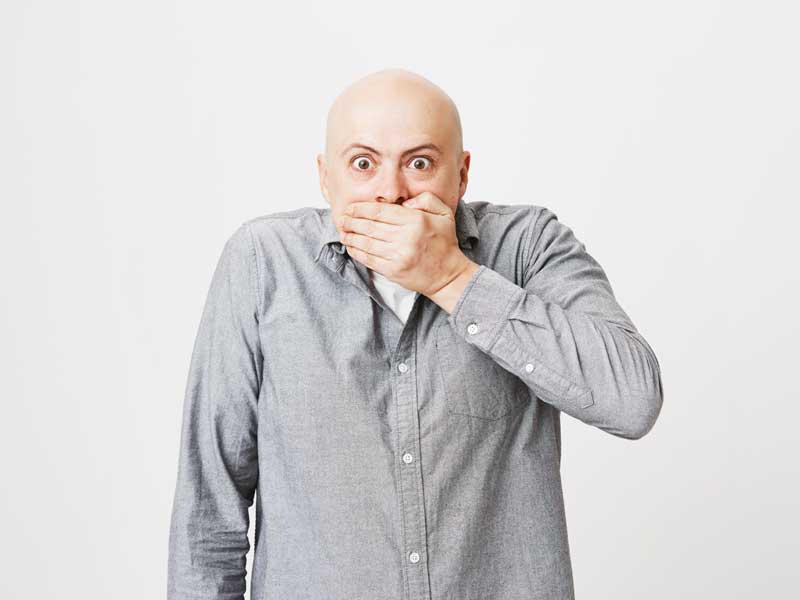Symptoms, causes, and treatments for Phalacrophobia
Do you have an irrational fear of becoming bald—or even fear of bald people? If so, you’re not alone.
A surprisingly large number of people experience this anxiety, and it even has a clinical name: phalacrophobia.
Phalacrophobia is more than just worry about hair loss. It’s an irrational, uncontrollable fear that can trigger anxiety, panic attacks, and avoidance behaviors.
Some people become so obsessed with counting every hair they lose that it disrupts their daily life.
Others feel intense discomfort around bald individuals, or even catastrophize about losing their hair when there’s no actual sign of baldness at all.
The irony is that this fear often makes the situation worse. Stress and anxiety can actually trigger real hair loss (telogen effluvium), turning the phobia into a self-fulfilling prophecy.
That’s why understanding what phalacrophobia is, recognizing its symptoms, and knowing how to manage it—with psychological support or medical solutions—is so important.
In this guide, we’ll explain the meaning of phalacrophobia, common triggers and symptoms, why this fear develops, and most importantly, practical steps to overcome it.
Whether your fear is causing you real distress or you’re just curious about this condition, read on—there is help available, and you don’t have to live with this anxiety.
What Is Phalacrophobia? (Definition & Symptoms)
Phalacrophobia is an irrational, uncontrollable fear of baldness—whether it’s the fear of losing your own hair or the fear of bald people in general.
Unlike normal concern about hair loss, phalacrophobia becomes an obsessive thought pattern that the person cannot control or rationalize away, even when there’s no real evidence of baldness.
Key characteristics:
- Fear that feels real even without evidence: A person may experience intense panic about going bald even when they have a full, healthy head of hair and no family history of baldness.
- Fear of bald individuals: Some people with phalacrophobia feel intense discomfort—or even aversion—around bald men or women, which can lead to avoidance and social isolation.
- Physical symptoms: The anxiety can trigger real physical responses like panic attacks, nausea, shortness of breath, trembling, and dizziness—just from thinking about hair loss or seeing a bald person.
- Obsessive counting and checking: Many people with phalacrophobia become hyper-aware of every hair they lose—counting strands in the shower, after brushing, or even while sleeping. This vigilance can increase anxiety rather than provide reassurance.
- Distorted perception: In severe cases, the mind can play tricks; a person may believe they’re losing hair or see bald spots that don’t actually exist, despite evidence to the contrary.
How it affects daily life:
Phalacrophobia isn’t just “worrying a bit about hair loss.” It can seriously disrupt:
- Social interactions: Avoiding friends, family, or public spaces where they might encounter bald individuals.
- Work and focus: Constant mental preoccupation with hair loss makes concentration difficult.
- Sleep and stress: Anxiety about the future can cause sleep problems and physical tension.
- Relationships: Partners may struggle to understand why the fear seems so irrational or why reassurance doesn’t help.
What Causes Phalacrophobia? (Origins & Risk Factors)
Phalacrophobia doesn’t develop randomly. While it can affect both men and women, research and clinical observation point to several underlying causes and risk factors.
Why is it more common in men?
Men are statistically more vulnerable to phalacrophobia, largely because they face a higher actual risk of male pattern baldness (androgenetic alopecia).
It’s estimated that around 50% of men over age 50 experience some degree of hair loss, making the fear feel more “justified” and therefore harder to dismiss as irrational.
This biological reality combined with social pressure can amplify anxiety.
Main causes and triggers:
- Childhood trauma or negative associations
Many people with phalacrophobia report experiencing or witnessing something negative related to baldness or bald individuals during childhood. This trauma—whether direct ridicule, a scary figure, or even subtle messages—can become embedded as an unconscious fear that resurfaces in adulthood without clear explanation. - Fear of social rejection and changing appearance
Despite modern attitudes, society often associates hair with youth, attractiveness, and virility. A person with phalacrophobia may be hyper-focused on how others perceive them, fearing that hair loss = social rejection. This anxiety about judgment from peers can intensify the phobia far beyond the actual cosmetic concern. - Existential anxiety (fear of aging and mortality)
For many, hair loss symbolizes something deeper: the passage of time, aging, and inevitably, death. Losing hair becomes a visible reminder of physical decline and human mortality. People who struggle with existential anxiety—the fear of getting older and facing their own mortality—often develop or intensify phalacrophobia as a manifestation of this deeper fear. - Genetic predisposition to anxiety
Some individuals are naturally more prone to anxiety disorders or obsessive-compulsive tendencies. These personality traits make them more vulnerable to developing any phobia, including phalacrophobia.
How to Overcome Phalacrophobia (Treatment & Coping Strategies)
If you’re struggling with phalacrophobia, the good news is that professional help can make a real difference.
Unlike irrational fears that disappear on their own, phalacrophobia usually requires a combination of psychological support and, sometimes, medical reassurance.
Step 1: Seek psychological help
The most important first step is talking to a mental health professional—ideally a psychologist or therapist experienced with anxiety disorders or phobias. They can help you:
- Understand the root causes of your fear (childhood trauma, existential anxiety, social pressure).
- Learn cognitive-behavioral techniques (CBT) to challenge catastrophic thoughts and break the obsessive counting/checking cycles.
- Develop coping strategies for anxiety triggers (like hearing about baldness in ads or seeing bald individuals).
- Gradually expose yourself to the feared stimulus in a safe, controlled way (exposure therapy).
Proper psychological treatment has a strong track record of reducing phobia symptoms significantly.
Step 2: Get a professional hair/skin diagnosis
If you’re experiencing actual hair loss symptoms (noticeable thinning, bald spots, or excessive shedding), don’t rely on internet searches or mirror-checking—see a dermatologist.
A professional can:
- Confirm whether you actually have hair loss or if it’s perceived due to anxiety.
- Identify the type (male/female pattern baldness, telogen effluvium, alopecia areata, etc.).
- Rule out medical causes (thyroid, nutritional deficiencies, hormonal imbalances).
- Recommend evidence-based treatments like minoxidil or finasteride if appropriate.
Important: Many people experience temporary hair shedding due to stress, seasonal changes, or post-illness recovery (telogen effluvium). In these cases, the hair often regrows naturally within months—reassuring news that only a professional diagnosis can provide.ئ
Step 3: Separate real hair loss from anxiety
This is critical: Not every hair you lose is a sign of baldness. Normal daily shedding is 50–100 hairs. Obsessive counting can feel alarming but doesn’t predict future hair loss. A dermatologist can measure actual hair density and track changes over time—removing guesswork and feeding the obsession.
Step 4: Address the underlying anxiety
Beyond phobia-specific therapy, managing your overall anxiety helps:
- Reduce stress through exercise, meditation, or mindfulness.
- Limit social media and comparison culture (which amplifies appearance anxiety).
- Address deeper fears about aging, mortality, or social acceptance with a therapist.
- Build self-worth not solely on appearance.
When medical solutions become relevant
If professional diagnosis confirms actual hair loss, modern treatments offer real hope:
- Topical or oral medications can slow or stop hair loss.
- Hair transplant surgery (like FUE) is a permanent, natural-looking solution if hair loss progresses.
The key point: Knowing you have options reduces anxiety. Once you’ve ruled out serious baldness or confirmed treatable hair loss, the fear often becomes easier to manage psychologically.
Final Thoughts: Phalacrophobia Doesn’t Have to Control Your Life
If you’ve read this far, you now understand that phalacrophobia is a real anxiety disorder—not just vanity or shallow worry.
The fear you feel is valid, but it doesn’t have to define your future or your self-image.
The bottom line:
- If you’re experiencing anxiety about hair loss that feels uncontrollable, seek help from a mental health professional. Therapy works, and you don’t have to live with constant fear.
- If you suspect actual hair loss, get a professional diagnosis. Knowing the truth—whether it’s temporary shedding or permanent baldness—is far less stressful than endless worry.
- If hair loss is confirmed and it bothers you, modern solutions exist and are highly effective:
- Medical treatments can slow or stop hair loss.
- Advanced techniques like FUE hair transplants offer permanent, natural-looking results—even in cases of complete baldness.
Why certainty matters more than fear
Many people with phalacrophobia spend years checking mirrors, counting hairs, and avoiding social situations—only to discover later that their hair was never actually at risk.
That wasted anxiety could have been prevented with a simple professional assessment.
On the other hand, if you do have hair loss, knowing this fact and having a treatment plan is far more empowering than living in denial and fear.
Ready to take the next step?
Whether you need psychological support, a dermatological assessment, or information about hair restoration options,
Clinicana specializes in comprehensive hair health—from diagnosis to treatment.
We work with patients who have phalacrophobia, real hair loss, or both.
Request a free consultation to discuss your concerns in a judgment-free environment.
Our team can assess your situation, answer your questions, and provide a personalized plan—with no obligation.

What causes excessive sweating of the head and face? If you often notice excessive head sweating, a sweaty scalp, or forehead sweating even when it isn’t hot, you may be dealing with hyperhidrosis. Sweating is a normal way for the body to cool down, but with hyperhidrosis the sweat response can be out of proportion—sometimes triggered by stress, certain foods, […]

Before asking “When can I wear a helmet after a hair transplant?”, it is crucial to understand that patience is key to protecting your investment. Every day, patients contact Clinicana not only to ask about the hair transplant cost in Turkey (Precio trasplante capilar Turquía), but also about the post-operative care required to ensure the best results. If […]

Hair growth after chemotherapy is one of the biggest concerns for people undergoing treatment and coping with hair loss. For many patients, losing hair can feel traumatic because it changes their personal image so suddenly, adding to the stress and fear that often come with cancer. So, does hair grow back after chemotherapy? Many people […]






